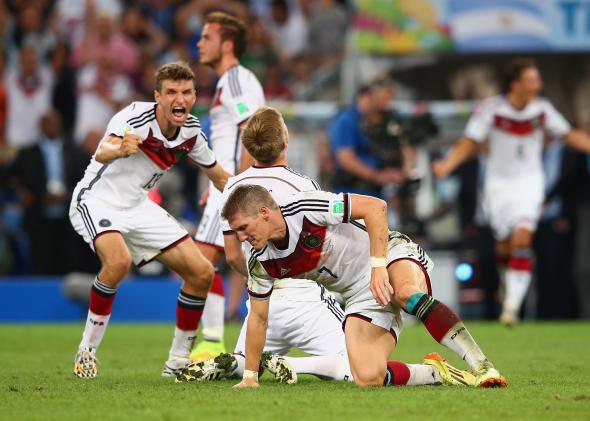The World Cup’s best team won the tournament with one of the best goals of the competition. In the second half of extra time, substitute André Schürrle made a fantastic run down the left side of the field, driving in a perfect cross to another substitute, Mario Götze, who trapped the ball with his chest and beat Argentine goalkeeper Sergio Romero with a left-footed shot. Congratulations, Mario: You’re 22 years old, and you’ll never have to buy the beer or schnitzel for the rest of your life.
Germany’s 1-0 win over Argentina is Die Mannschaft’s fourth World Cup title, and its first since 1990. This is the first time a team from Europe has won the World Cup in South America, and it took a fantastic team to do it.
It was not, though, a fantastic final. Solid defending from both sides meant that there were few scoring chances, and the chances the teams did earn were botched in one way or the other. Aside from Toni Kroos’ near-disastrous back pass in the first half, the Germans made few major errors, but didn’t show the brilliance that marked their historic 7-1 blowout of hosts Brazil in the semifinals. It’s easier to look brilliant, it turns out, when your opponent is in total shambles.
Götze’s late winner was a deserving one for a team that did outplay Argentina, and it exemplified what makes this German team great. Schürrle’s speed down the flank made the goal possible, and Götze’s skill ensured that the ball would find its way to the back of the net. The fact that both players were substitutes reveals how strong and deep the German system has become since the failures of Euro 2000, which led the nation to reform its national program. (Ken Early has those details in a great piece written before the World Cup.) It’s also worth noting that Götze plays for Bayern Munich, a club that makes up the spine of this German squad, just as Barcelona made up the core of 2010 champions Spain. Given that so many of the Germans play together during the club season, it seems almost unfair to foist them on less cohesive international sides.
Argentina did well to hold the Germans down, nearly keeping its fourth consecutive clean sheet after shutouts of Switerland, Belgium, and the Netherlands. Gonzalo Higuaín will regret two missed first-half chances, and Lionel Messi had just one good look, which he left just outside the post. The Argentines’ last chance came on a free kick that Messi sailed over the bar. It was a shame that this was how the tournament ended, with the world’s best player failing in a final, futile effort to bring Argentina its first World Cup title since Diego Maradona led the 1986 team to glory.
FIFA’s decision to award Messi the golden ball as the best player in the tournament (over Colombia’s James Rodríguez, most notably) seems almost cruel. That decision could open Messi up to even more criticism, highlighting the fact that the sport’s golden boy didn’t have a golden final.
No, he didn’t win a World Cup like Maradona did. But as my colleague Jeremy Stahl wrote this weekend, an Argentina loss doesn’t change the fact that Messi is an all-time great. Germany had the better team. Argentina had the best player. The team won, and that’s how it should be.
